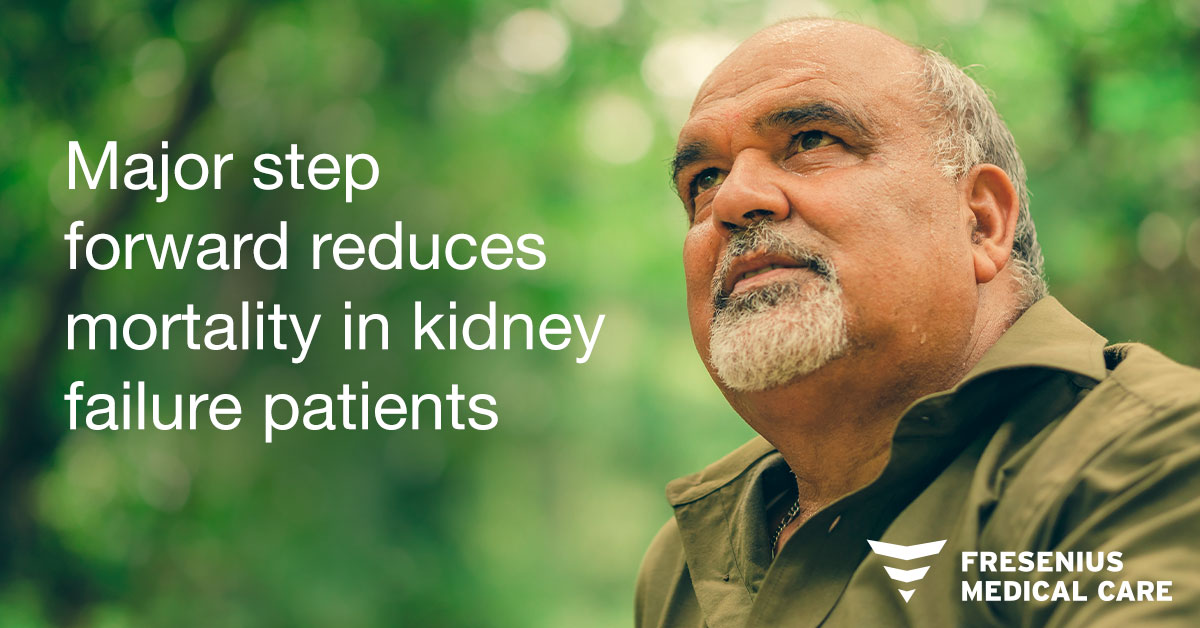The CONVINCE Trial study compares high-dose hemodiafiltration with standard, high-flux hemodialysis. Study revealed a 23% decrease in mortality rates for patients treated with high-volume hemodiafiltration compared to those treated with more commonly used high-flux hemodialysis. Exploration of methods to increase adoption of hemodiafiltration (HDF) making this therapeutic option accessible to patients

Image: Fresenius Medical Care
Fresenius Medical Care, the world’s leading provider of products and services for individuals with renal diseases, participated in groundbreaking research that demonstrates that the mortality rate among kidney failure patients can be significantly reduced through the utilization of high-dose hemodiafiltration technology. Conducted by the CONVINCE consortium and led by the University Medical Center Utrecht, this international, randomized controlled trial marks a crucial milestone in comparing high-dose hemodiafiltration with standard, high-flux hemodialysis.
The study’s findings reveal that patients treated with high-dose hemodiafiltration experienced a remarkable 23% decrease in mortality rates compared to those treated with the more commonly used high-flux hemodialysis. Hemodialysis represents the most prevalent form of dialysis for treating kidney failure. While techniques have improved over time, conventional high-flux hemodialysis primarily employs diffusion to remove small molecules and fluid from the blood. In contrast, high-dose hemodiafiltration incorporates both diffusion and convection techniques to eliminate larger molecules and effectively manage fluid replacement through convection.
Frank Maddux, MD, Chief Global Medical Officer of Fresenius Medical Care, expressed enthusiasm over the study’s results, stating, “This meticulously designed and executed clinical study unquestionably demonstrates the efficacy of high volume hemodiafiltration for a significant portion of kidney failure patients. These findings have the potential to prompt significant changes in the standard treatment approach and, most importantly, contribute to reducing mortality rates among this vulnerable population in need of kidney replacement therapy.”
Lead investigator Professor Peter Blankestijn from UMC Utrecht commented, “Our results unequivocally demonstrate the survival benefits of utilizing hemodiafiltration over hemodialysis in the treatment of kidney failure, akin to a remarkable 23% reduction in all-cause mortality. I am optimistic that hemodiafiltration can become the new standard of care.”
Chronic kidney disease poses a pressing global health challenge, affecting an estimated 830 million individuals worldwide, with nearly four million people reliant on dialysis. When the kidneys can no longer perform their vital functions, dialysis is employed to cleanse the blood by eliminating waste products and regulating fluid volume in the body.
The trial encompassed a total of 1,360 patients across 61 centers in eight European countries and followed up for a median of 30 months. Of these, 683 patients received high-dose hemodiafiltration and 677 received high-flux hemodialysis three times a week. The rate of mortality was 7.1 deaths per 100 patient-years in the group randomized to hemodiafiltration compared to 9.2 deaths per 100 patient-years in the hemodialysis group, corresponding to a relative reduction of 23%.
The CONVINCE trial was spearheaded by researchers from UMC Utrecht in collaboration with University College London (UCL), Charité Universitätsmedizin Berlin, University of Bari, The George Institute for Global Health, Imperial College London, and dialysis providers Fresenius Medical Care, Diaverum, and B. Braun Avitum.
While hemodialysis serves as the standard treatment in most countries, hemodiafiltration remains underutilized in certain regions and is yet to be adopted in places like the U.S. Fresenius Medical Care has taken the lead in developing machines that facilitate online fluid generation and innovative techniques for delivering hemodiafiltration.
“Fresenius Medical Care has a rich history of driving innovation in renal care, aimed at improving the lives of kidney disease patients worldwide,” emphasized Frank Maddux, MD. “As pioneers in dialysis and membrane technologies, we will continue to explore methods that promote the adoption of hemodiafiltration, making this crucial therapeutic option more readily accessible to the patients we serve.”
Fresenius Medical Care is the world’s leading provider of products and services for individuals with renal diseases of which around 3.9 million patients worldwide regularly undergo dialysis treatment. Through its network of 4,060 dialysis clinics, Fresenius Medical Care provides dialysis treatments for approximately 343,000 patients around the globe and is the leading provider of dialysis products such as dialysis machines and dialyzers. Fresenius Medical Care is listed on the Frankfurt Stock Exchange (FME) and on the New York Stock Exchange (FMS).
Disclaimer:
This release contains forward-looking statements that are subject to various risks and uncertainties. Actual results could differ materially from those described in these forward-looking statements due to various factors, including, but not limited to, changes in business, economic and competitive conditions, legal changes, regulatory approvals, impacts related to COVID-19, results of clinical studies, foreign exchange rate fluctuations, uncertainties in litigation or investigative proceedings, and the availability of financing. These and other risks and uncertainties are detailed in Fresenius Medical Care AG & Co. KGaA’s reports filed with the U.S. Securities and Exchange Commission. Fresenius Medical Care AG & Co. KGaA does not undertake any responsibility to update the forward-looking statements in this release.
The information in this document is provided as is and no guarantee or warranty is given that the information is fit for any particular purpose. The user thereof uses the information at its sole risk and liability. The opinions expressed in the document are of the authors only and in no way reflect the European Commission’s opinions.
The CONVINCE study was exclusively supported by the European Commission Research & Innovation, Horizon 2020, Call H2020-SC1-2016-2017 under the topic SC1-PM-10-2017: Comparing the effectiveness of existing healthcare interventions in the adult population (grant no 754803).
Source: Company Press Release
